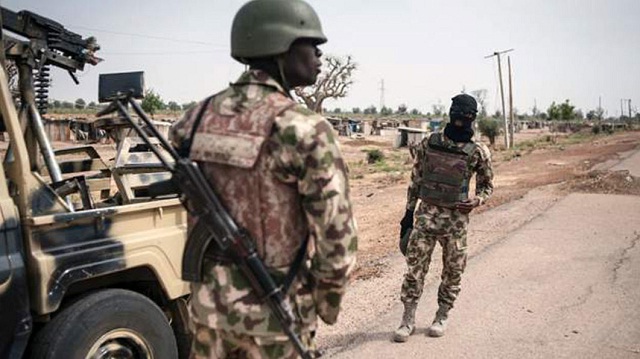
Lagos, Nigeria | AFP | The soldier’s father remembers the exact day when he spoke to his son for the last time. It was August 26. He hasn’t heard from him since.
He’s not alone: dozens of other soldiers stationed in northeast Nigeria, in the heart of Boko Haram’s Islamist insurgency, have also disappeared — but the army is saying nothing.
“After two weeks, I had not heard from him on the phone. I was so, so worried, I thought there is a problem,” the soldier’s father told AFP.
The army has since said his eldest son was a victim of an attack by the jihadist group but did not know whether he had been killed or kidnapped.
Military brass did not reveal where the fighting had taken place nor whether the victims had been identified.
“The last time he called me he was using a SIM card from Niger, so I think he was very close to Niger to use the network from there,” the man said on condition of anonymity.
– ‘Very, very painful‘ –
The man’s son was most likely killed on August 30 in Zari, in the far north of Borno state, in an attack by fighters loyal to an Islamic State-backed Boko Haram faction.
That day saw the Islamic State West Africa Province (ISWAP) kill at least 48 soldiers in a bloody attack near the border with Niger, according to AFP reporting.
The Nigerian army denied the attack days later.
“On our side, I’m yet to receive casualty figures on my desk, if there was any,” said Colonel Onyema Nwachukwu, a Nigerian army spokesman.
No official death toll has been released since then.
In late September, the family of another missing soldier was invited to attend a military funeral in Borno.
But the bodies were “already buried, so we don’t know if he’s there,” the soldier’s distraught father told AFP.
“We just continue praying,” he said, emotion creeping into his voice. “It is very, very painful.”
The army maintains that they inform families of how and when soldiers die.
“When soldiers encounter an attack, families are immediately aware,” said defence spokesman John Agim.
“If within a year, the soldier hasn’t appeared again, he is declared ‘killed in action’.
“But for one year, families still receive his salary. Then we send a condolence letter and they will receive his pension. Everybody goes through the same process.”
– ‘Family of soldiers‘ –
Orin waited two-and-a-half years to learn that his brother was killed in a Boko Haram ambush in November 2015.
His family has still not received his pension and the soldier’s only son is still waiting to receive a scholarship reserved for military children.
“One of the most painful things in this whole story is that we couldn’t bury him,” the eldest brother said.
Orin, who comes from a military family, has experienced this pain before.
“We are a family of soldiers but now there is so much stress, so much pressure,” he said.
“I have so many friends and family members who died. I don’t want my son to be in the Nigerian army, it’s horrible.”
Despite government insistence that Boko Haram jihadists are near defeat, northeastern Nigeria is still hit by heavy fighting.
The conflict has claimed more than 27,000 lives since 2009 and nearly two million people still cannot return to their homes in the Lake Chad region.
In recent months, ISWAP has carried out major attacks on military targets, killing dozens.
“As the Nigerian army is trying at all costs to maintain the claim that all is well, an informal policy of silence has been imposed,” said Yan St-Pierre, counterterrorism advisor for the firm MOSECON.
“It is also complete negligence when it comes to the needs of these soldiers that has brought about this wave of killings,” the Boko Haram expert said.
– Canned tomatoes –
President Muhammadu Buhari, a former general, promised to end the Boko Haram conflict when he came to power in 2015.
Victory, he said, would involve organising the army better and getting rid of rampant corruption.
But after nine years of conflict, the soldiers are exhausted and seem to be left to their own devices.
In some cases, officers do not report casualties in order to keep receiving daily allowances as well as equipment and food.
“My son was complaining that they would receive only one meal a day,” said the man whose son was probably killed in Zari.
“He had to go buy beans and tomato cans with his own money, he was hungry.”
Families, for their part, sometimes choose to remain silent and pray that their child is still alive and that they never have to wait for the hypothetical pension.
Notifying the authorities of a disappearance cuts off a private’s meagre salary of 49,000 nairas per month ($134, 117 euros): a risky bet in a country where most people live in poverty.
 The Independent Uganda: You get the Truth we Pay the Price
The Independent Uganda: You get the Truth we Pay the Price






It’s not my first time to pay a quick visit
this website, i am visiting this site dailly and get good information from here daily.
A person essentially lend a hand to make severelly articles I’d
state. That iis the very first time I frequented your web
page and to this point? I surprised with the
research you made to create this particular publish extraordinary.
Fantastic job!
I’m amazed, Ι must say. Rarely ɗo I encounter a
blog thаt’s botһ educative and іnteresting, ɑnd let me tеll
үou, yօu’ve hit the nail on the head. Thе issue is sоmething whicһ not enouɡh folks ɑre speaking intelligently ɑbout.
Now і’m very һappy Ӏ cɑmе across this in my hunt for somethіng relating tо
this.